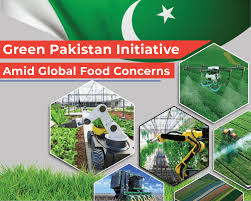Mechanized and modern farming is the only way forward to boost Pakistan’s agricultural economy. Pakistan’s agriculture sector contributes only 22.9 percent to the GDP despite employing 37.4 percent in labour force. In order to transform the economic landscape this low-productivity needed an immediate reformation. Landmark steps have been taken recently to revolutionize the production of Agriculture sector of Pakistan. All these initiatives have been taken under a collaborative effort between the government of Pakistan and its Armed Forces.
A national seminar on Food Security was held at Jinnah Convention Centre in Islamabad. Muhammad Shehbaz Sharif, Honourable Prime Minister of Pakistan graced the occasion as Chief Guest. Addressing the seminar, the chief guest and PM of Pakistan said farmers worked hard day and night to flourish agriculture in Pakistan, adding that they provided millions of people with food. “Farmers need resources to boost agriculture,” he added. The Guest of honor and Pakistan’s Chief of Army Staff General Syed Asim Munir also attended the seminar and addressing the seminar, he assured Pakistan Army’s full support for all the initiatives being initiated under the ambit of Special Investment Facilitation Council including today’s launched Green Pakistan Initiative.
It’s the second time when Pakistan will witness a Green Revolution to revamp Agriculture sector. The first Green Revolution was initiated in 1965 when there was a three-fold increase in output of Food grains during 1967-1992. It was the time when modern equipment of that era – such as a tractor was first used in agriculture.
Over decades, population growth has led to increased food consumption and waste, exacerbating the problem of unsustainable food production and consumption, which underlies numerous global challenges. According to United Nations Environment Programme (UNEP), the global demand for food is projected to increase by 60 percent by 2050. This alarming situation puts country like Pakistan under extreme risk where there is a declining trend of Agricultural production. But, the potential of Pakistan’s soil is so massive that it can fairly contribute towards lowering the global food security concerns.
The recent steps taken towards the progress of this untapped resource in Pakistan are revolutionary. 9 million hectares of uncultivated wasteland will be utilized with the help of Land Information and Management System (LIMS) established by Pakistan Army. The country’s Army using its skilled human resource and modern technology will help transform the future of Pakistan’s Agriculture Industry. This will be a paradigm shift in the nation’s approach to land administration and agricultural development. LIMS being a state-of-the-art System will revolutionize means to steer agricultural development through real time information about land, crops, weather, water resource pest handling under one roof. It will not only address food security concerns but also enable the country to explore export opportunities and contribute to the growth of its economy. Moreover, by granting access to state land for Modern Agro Farming, there will be an influx of investments, innovation will be promoted and new job opportunities will be created.
The U.S. Embassy in Islamabad hosted a reception to commemorate the 247th anniversary of the independence of the United States of America on July 7th. Prime Minister of Pakistan Mian Muhammad Shehbaz Sharif was the guest of honor, representing the people and government of Pakistan. In addition to celebrating Independence Day, the event recognized the achievements of the U.S.-Pakistan Green Alliance framework and looked ahead to the many opportunities for continued and expanded partnership between the United States and Pakistan.
The U.S.-Pakistan Green Alliance framework is a transformative initiative addressing today’s most pressing environmental challenges, especially around water management, climate-smart agriculture, and renewable energy. Beyond mitigating climate change and its effects, the partnership recognizes that green choices also present tremendous economic opportunities, opening doors for increased bilateral trade and investment, as well as the creation of new jobs and industries. The initiative actively promotes the inclusion of women in the economy to ensure that the path to a greener, more sustainable future is empowering for all.
In addition to giving unprecedented incentives to the Agricultural sector in the recent budget, the Government of Pakistan is also in contact with many countries for uplifting Pakistan’s agricultural economy. The Food and Agriculture Organisation (FAO) of the United Nations has also assured Pakistan that it will continue to play a leading role in transforming the country’s agriculture food systems to make them more efficient, inclusive, sustainable and resilient. Collaborations are being made with KSA, China, UAE, Qatar and Bahrain for various Agri Projects, which will certainly enhance our exports. Finland is working for seed, forestry and biodiversity. Prime Minister Shehbaz Sharif on June 3, 2023 invited Turkish investors and businessmen to expand their investment in various areas of Pakistan. He called for establishing strategic collaboration in sectors of energy, agriculture, information technology (IT), and construction. The aim is to make Pakistan self-resilient both in terms of national economy and food production.


